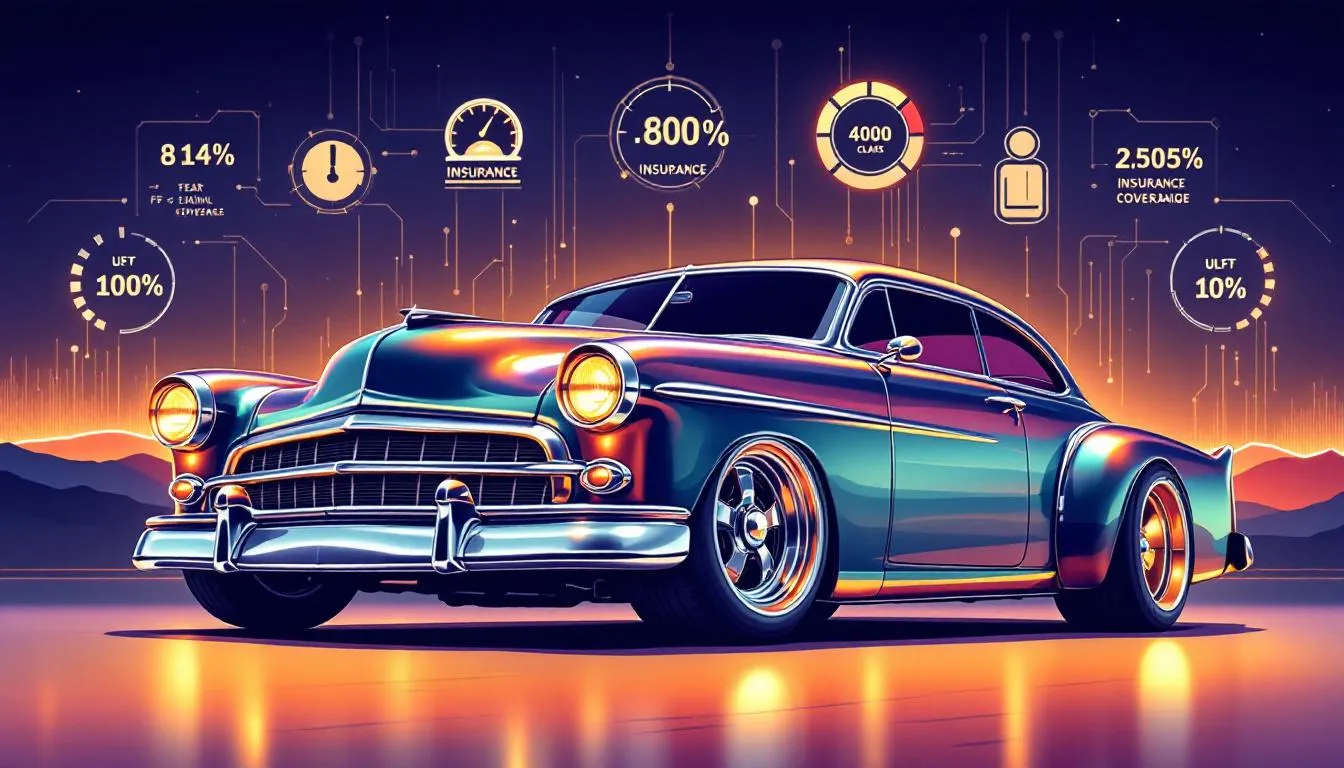Wondering if the myths about classic car insurance are true? This article clears up the Top 5 Myths About Classic Car Insurance Busted. Discover the real facts behind common beliefs like high costs or driving limitations, so you can insure your classic car confidently.
Key Takeaways
- Classic car insurance is often more affordable than standard auto insurance, with annual premiums typically ranging from $400 to $600 due to factors such as lower driving frequency and secure storage.
- Many classic car insurance policies allow for occasional driving with reasonable mileage limits, debunking the myth that these vehicles cannot be used regularly.
- It is crucial for classic car owners to select specialized mechanics for repairs, as standard mechanics may lack the expertise required for vintage vehicles, ensuring the vehicle’s maintenance and value are preserved.
Myth: Classic Car Insurance Is Too Expensive

One of the most persistent myths surrounding classic car insurance is the belief that it is prohibitively expensive. Many potential classic car owners shy away from purchasing their dream vehicle due to the fear of sky-high insurance premiums. But is this fear justified?
In reality, the cost of classic car insurance is often much lower than standard auto insurance. The typical annual premium for classic car insurance ranges between $400 to $600, significantly less than the $1,000 average for standard auto insurance, highlighting the lower insurance costs associated with specialized coverage. This is a pleasant surprise for many, proving that specialized insurance can indeed be cost-effective.
Several factors contribute to these lower premiums:
- Classic car owners often maintain a clean driving record, which can lead to substantial discounts on their driving record car insurance premium and their driving history.
- These vehicles are typically driven less frequently.
- They are often kept in secure storage, further reducing the risk and, consequently, the car insurance premiums. Additionally, many seek out cheaper insurance options to further enhance their savings and save money. Furthermore, the insurance premium for classic cars can be more favorable due to these factors.
Specialized classic car insurance policies also play a significant role in keeping costs down. These policies are tailored specifically for classic cars, taking into account their limited use and the owners’ dedication to preservation. This focused approach allows most insurance companies to offer competitive rates that reflect the actual risk involved.
So, the next time you hear someone claim that classic car insurance is too expensive, remember: this is one of the most common car insurance myths debunked. With the right policy, you might find that insuring your classic car is more affordable than you ever imagined. To ensure you get the best deal, make sure to compare quotes.
Myth: You Can’t Drive Your Classic Car
Another widespread myth is that classic car insurance restricts you from driving your cherished vehicle. This misconception can be a significant deterrent for those who dream of taking their classic car out for a spin on sunny weekends. But is this really the case?
The truth is, many classic car insurance policies offer provisions for occasional driving. While it’s true that these policies often include mileage limits, they are generally quite reasonable. Most policies allow for up to 5,000 miles per year, giving you plenty of opportunities to enjoy your vehicle and drive fewer miles without breaching the terms of your car insurance policy.
Moreover, these policies are designed with flexibility in mind. They accommodate the needs of classic car owners who want to participate in car shows, parades, or simply take their car’s for a leisurely drive, potentially leading to a better understanding of the specific terms of your policy and ensuring it aligns with your driving habits as a car owner and the use of motor vehicles.
One reason for the lower car insurance rates of classic cars is the assumption that these vehicles will be driven fewer miles and stored securely when not in use. This reduced risk of accidents and theft allows auto insurance companies to offer more attractive premiums.
Many classic car insurance policies cover occasional drives, allowing you to enjoy your classic car without worrying about voiding your insurance. Just be sure to keep track of your mileage and adhere to the policy limits.
While it’s a common misconception that classic car insurance confines your car to the garage, the reality is you have the freedom to enjoy your vehicle with some reasonable restrictions. This flexibility ensures that you can make the most of your classic car ownership experience.
Myth: Any Mechanic Can Repair Your Classic Car
When it comes to maintaining and repairing classic cars, there’s a prevalent myth that any mechanic can do the job. This assumption can lead to significant issues, as classic cars often require specialized skills and knowledge that not all mechanics possess.
Classic cars are unique in their design and parts, which means that repairs often demand a higher level of expertise. Mechanics who are experienced with vintage vehicles understand the nuances of these older cars and can provide the care and precision required to maintain their authenticity.
Insurance providers recognize this need for specialized services. Many policies include recommendations for repair shops that have the expertise needed to handle classic cars. This ensures that any repairs are carried out by professionals who are well-versed in the intricacies of vintage vehicles.
Choosing the right mechanic is not just about preserving the car’s aesthetic value but also about maintaining its operational integrity. Repairs done by inexperienced mechanics can lead to further damage and higher costs down the line. Therefore, it is crucial to select a mechanic with a proven track record of working on classic cars.
In conclusion, believing any mechanic can repair your classic car is a myth. Ensuring that your vehicle receives the specialized care it needs will help maintain its value and performance, allowing you to enjoy it for many years to come.
Myth: Classic Cars Don’t Need Comprehensive Coverage

Some classic car owners believe that comprehensive coverage is unnecessary for their vehicles, thinking that basic liability insurance and auto insurance coverage will suffice. However, this insurance company is a dangerous misconception that can leave owners financially vulnerable in the event of unexpected damage.
Comprehensive coverage is essential for classic cars due to the financial protection it offers against a wide range of risks. This type of insurance covers damage from events such as vandalism, theft, and severe weather, which are not included in basic liability insurance. Given the high value and historical significance of classic cars, comprehensive coverage is a prudent choice.
Classic cars often come with high repair costs due to the need for original or high-quality reproduction parts. Comprehensive insurance ensures that these parts are used in repairs, maintaining the car’s authenticity and value. This is particularly important for preserving the vehicle’s historical integrity.
Additionally, comprehensive insurance covers the labor costs associated with specialized mechanics. These professionals have the expertise needed to restore classic cars to their original condition, ensuring that the vehicle remains a true classic. This level of coverage provides peace of mind to owners who want to protect their investment.
In summary, comprehensive coverage and full coverage are vital components of classic car insurance, offering complete protection against a variety of risks and ensuring repairs are done to the highest standards. Classic car owners should not overlook the importance of right coverage in safeguarding their beloved vehicles.
Myth: Classic Car Insurance Covers All Modifications

A common myth among classic car owners is that their insurance automatically covers all modifications made to their vehicle. This assumption can lead to unpleasant surprises when filing a claim, as not all modifications are included in standard classic car policies.
It is crucial to disclose any modifications to your insurance provider to ensure they are covered. Failure to report these changes can result in diminished insurance claims payouts or outright denial of coverage. Being transparent about modifications helps avoid misunderstandings and ensures that your vehicle is adequately protected when filing claims.
Modifications can impact insurance premiums, with insurers often adjusting pricing based on the extent of changes made to the vehicle. Some alterations may increase the risk associated with the car, leading to higher premiums. Therefore, it’s essential to understand how your modifications affect insurance rates and costs.
Insurance policies have coverage levels and coverage limits, and not all modifications may be covered under a standard health insurance policy. Reviewing your insurance coverage options and discussing any changes with your insurance provider will help you understand what is covered and whether additional coverage is needed.
In conclusion, while classic car insurance can offer extensive protection, it does not automatically cover all modifications. Disclosing any changes and understanding your policy’s limits can ensure your vehicle is fully protected.
Summary
In this blog post, we have debunked five common myths about classic car insurance. From the misconception that classic car insurance is too expensive to the belief that you can’t drive your classic car, we have shown that the reality is often much more favorable for classic car owners.
Understanding these myths and the truths behind them is crucial for making informed decisions about your classic car insurance. By dispelling these misconceptions, we hope to empower classic car owners to secure the right coverage for their valuable vehicles.
As you review your insurance policies, remember the importance of comprehensive coverage, specialized repairs, and transparency about modifications. With the right knowledge and approach, you can protect your classic car and enjoy its timeless beauty for years to come.
Frequently Asked Questions
Is classic car insurance more expensive than standard auto insurance?
Classic car insurance is typically less expensive than standard auto insurance, with annual premiums generally ranging from $400 to $600, compared to the average of $1,000 for standard policies.
Can I drive my classic car if I have classic car insurance?
Yes, you can drive your classic car if you have classic car insurance, as many policies permit occasional use with reasonable mileage limits, often up to 5,000 miles per year.
Do I need a specialized mechanic for my classic car?
Yes, it is advisable to seek a specialized mechanic for classic car repairs, as they possess the necessary skills and knowledge required for vintage vehicles. This ensures proper care and maintenance for your classic car.
Is comprehensive coverage necessary for classic cars?
Comprehensive coverage is necessary for classic cars to safeguard against risks such as theft, vandalism, and severe weather, while also ensuring quality repairs with original or high-quality parts.
Does classic car insurance cover all modifications to my vehicle?
Classic car insurance does not automatically cover all modifications. It is crucial to disclose any changes to your insurer to ensure comprehensive coverage and understand any potential effects on your premiums.
